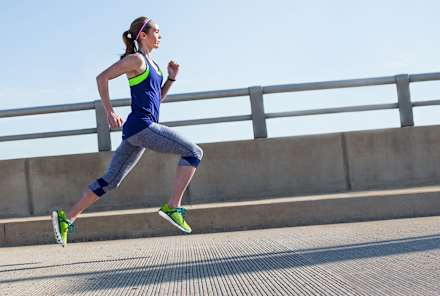Advertisement

We don't all deal with clinical constipation, but if you're human, it's likely you've experienced it at some point. And to feel the urge—but not be able to make it happen—can be frustrating and uncomfortable. Whether it be from medication, stress, or poor nutritional choices, many of us deal with gut-wrenching intestinal dry spells from time to time.
Solving the problem at hand is one thing, but figuring out how you got into this situation in the first place should be a top priority once relief comes. It's a delicate topic, and it's going to have to get a bit graphic at times, but at the end of the day, it's all in the name of science, and it's important to alleviate the backup. The more you know, the better you will be able to take a proactive approach to constipation.
The first thing to know is that there are actually several different forms of constipation, but most often it is caused by poor nutrition, lack of exercise, or emotional or stress-related issues. In addition, certain medications may cause constipation as a side effect, or you could be suffering from a more chronic condition known as irritable bowel syndrome (IBS). Also, conditions caused by nerve damage, such as Parkinson's, multiple sclerosis, stroke, or some forms of trauma can cause slow-transit constipation, meaning it simply takes too long for feces to move through the intestine. Any of these can be exacerbated by the common causes of constipation, especially when a poor diet or stress are concerned.
How to tell if you're constipated.
While most people don't like to think about their waste, it's time to take a good, hard literal look at your stool on a daily basis—and take some notes. By tracking the type of stool, as well as what you have eaten and how your day has been, you can begin to identify triggers for your constipation issues. Utilizing the Bristol Stool Chart can be a great way to help you classify your stool. When you fall in areas one and two, you are in definite constipation territory, with hard lumpy stools that are often tiny and hard to evacuate or tiny lumps clumped together that are also difficult to pass.
The muscles involved in constipation.
Since this topic is not one that pops up in normal conversation, it's important to educate yourself on normal bowel movements and proper procedure for optimum results. While defecating on a schedule may not be at the top of your priority list, our bodies often crave routine, so trying to time your bowel movements may be helpful. Strengthening your pelvic floor muscles should be on your exercise radar so that you can prevent urinary and bowel incontinence.
Straining too much while trying to have a bowel movement can weaken these muscles, so be sure that you are in a proper sitting position for smooth delivery. Squatting is actually the best way to go, so utilizing a stool in the bathroom to get your knees higher than your hips and leaning forward can ease the process. Deep diaphragmatic breathing can also help to brace your tummy as you gently push to move things along. Most importantly, do not strain. If it isn't happening, it isn't happening. Don't psych yourself out and up your stress levels even more. Take a break, drink something warm, or even take a warm bath to help your body relax.
The basics of constipation: nutrition, bacteria, and fiber.
A healthy gut depends on a balance of intestinal flora, or bacteria, and so do healthy bowel movements. In an antibacterial world, we shouldn't be so quick to turn up our nose at foods with live bacteria in them, like fermented foods, such as sauerkraut, kombucha, kefir, and kimchi, in addition to eating yogurt with live cultures in it. Eating "live" foods like these can encourage the diversity and richness of our intestinal flora. If fermented foods make your palate sour, then try taking a daily probiotic supplement. Additionally, the intestinal flora in our gut feed on prebiotics found in fiber, so a diet full of a variety of raw fruits and steamed vegetables will help keep your gut happy. Healthy fats also play an important role in gut health, so make sure you are getting cold-pressed coconut and olive oils and fatty acids like omega-3s in your diet. Keep in mind that any time you are taking antibiotics, you are killing both good and bad bacteria in your system, so be sure to replenish your gut by simultaneously taking probiotics. Your body will thank you!
On top of these basic tips for preventing constipation, there are a handful of natural remedies that you can take advantage of to help move things along, including essential oils like peppermint.
Peppermint essential oil for constipation.
High-quality essential oils can be your best friend when dealing with digestive unrest on a regular basis. Peppermint is the most commonly recommended solution for belly issues, especially when you're dealing with excess gas or bloating from the constipation. The menthol helps to soothe smooth muscle spasms in the colon, allowing for a relaxed passage through your intestine. Research has also shown peppermint essential oil in enteric-coated capsules to be successful in the treatment of irritable bowel syndrome1 (IBS). I recommend applying peppermint directly to your abdomen for quick relief, just make sure to double check with your doctor first if you have a chronic issue.
Ginger for constipation.
Ginger is another great ingredient with the ability to ease constipation. The sesquiterpenes found in ginger soothe digestive spasms2 and enable things to move along, as well as reduce occasional gas and bloating. Try diluting ginger in a teaspoon of carrier oil and massaging it into your abdomen. The warming sensation will help to promote relaxation. I also recommend adding a drop of ginger to your morning smoothie blend for a powerful antioxidant boost that supports digestion. For children, diluted cardamom is a better choice, as it supports digestion without the menthol content that could potentially affect their breathing.
Hydration for constipation.
Hard stools tend to be a frequent complaint3 when dealing with constipation and can indicate dehydration. A simple remedy is to increase your fluid intake. If you aren't drinking enough water, your colon and small intestine suck all of the moisture that it can get from your food, leaving only the hardened remains behind for you to evacuate. That said, if you are drinking enough water, adding more will not help your digestive issues. Just be sure that you are drinking at least 64 ounces of water per day. Just be sure that you are drinking at least 64 ounces of water per day.
Constipation and coffee.
For about a quarter of the population, coffee triggers a laxative effect4 in the body, which could help to alleviate constipation issues. Though research is unclear as to why this happens, for some of us that morning cup sends us directly to the restroom as a result of stimulating the distal colon. Although coffee has been long thought to be a diuretic, research5 has shown that consumption of coffee or caffeine over a period of time decreases the body's reaction to its diuretic properties. While scientists are uncertain as to what triggers the laxative response, you could be one of the lucky—or unlucky—ones who get relief from the brew.
The importance of fiber for constipation.
The obvious answer is always to up your fiber intake if you are suffering from constipation. A diet rich in leafy-green vegetables, brown rice, whole grains, beans, and certain nuts like almonds, pecans, or walnuts will keep things moving down below. Surprisingly, there are a number of incognito high-fiber foods out there providing deliciousness and variety to your daily diet. Raspberries, avocados, lentils, and apples can offer great results, especially if you have assumed bland grains were the only way to get more fiber in your diet.
The role of stress in constipation.
Did you ever think that there could be a hormonal component to your constipation? Reducing stress levels will lower your body’s cortisol levels and release its clench on your digestive system. When stress levels are high, our body perceives danger is near, sending us into a fight-or-flight response. It shuts down unnecessary systems, such as digestive and reproductive systems, and redirects our blood flow to our extremities so that we can fight off danger or run away.
When we allow ourselves to be inundated with chronic stress, our digestive system gets put on the back burner in favor of survival. Incorporating self-care routines into your day can help you to remain calm. Simple deep breathing exercises6 can lower cortisol levels and keep your body functioning at optimum levels. Couple that with calming essential oils7 like lavender or rosemary and you have a recipe for success and perhaps a trip to the bathroom once things calm down.
Magnesium for constipation.
When all else fails and you need to go to a hard-core (but natural) method, magnesium citrate may be the answer. While it can be purchased over the counter in liquid form, you want to be sure that you are under the advice of a trusted health care provider, as this can have serious side effects if used improperly. It encourages more water to enter the gut to hydrate stool and encourages better functioning of the intestinal muscles.
In general, a healthy adult can also take a magnesium supplement to encourage bowel movements and benefit their overall health, since most people are magnesium-deficient8 in the United States. You can take 200 to 300 mg per day as a supplement, pairing it with a B-complex vitamin for the best results if you experience other symptoms of magnesium deficiency, such as anxiety, sleep issues, chronic fatigue, and irritability. Be aware that often nutrition alone cannot provide enough magnesium, as poor diets laden with sugars or chronic stress can inhibit production.
Keeping your body in a steady routine and fueling it with a diet rich in fiber and hydrating fruits and vegetables can be the best defense against normal constipation, but stress-induced issues require more self-care and calming routines in your life. While coffee may be a quick fix for some, most of us will need to watch what we eat and keep our gut balanced with probiotics to ensure smooth sailing in the bathroom.
Want to know more about gut health? Here's the diet that is healing people's IBS.
8 Sources
- https://www.ncbi.nlm.nih.gov/pubmed/16121521
- https://www.ncbi.nlm.nih.gov/books/NBK92775/
- https://www.ncbi.nlm.nih.gov/pubmed/14681719
- https://www.ncbi.nlm.nih.gov/pmc/articles/PMC1378422/
- https://www.ncbi.nlm.nih.gov/pubmed/19774754
- https://www.ncbi.nlm.nih.gov/pubmed/27995346
- https://www.ncbi.nlm.nih.gov/pubmed/17291597
- https://www.ncbi.nlm.nih.gov/pubmed/15930481
Watch Next
Enjoy some of our favorite clips from classes
Enjoy some of our favorite clips from classes
What Is Meditation?
Mindfulness/Spirituality | Light Watkins
Box Breathing
Mindfulness/Spirituality | Gwen Dittmar
What Breathwork Can Address
Mindfulness/Spirituality | Gwen Dittmar
The 8 Limbs of Yoga - What is Asana?
Yoga | Caley Alyssa
Two Standing Postures to Open Up Tight Hips
Yoga | Caley Alyssa
How Plants Can Optimize Athletic Performance
Nutrition | Rich Roll
What to Eat Before a Workout
Nutrition | Rich Roll
How Ayurveda Helps Us Navigate Modern Life
Nutrition | Sahara Rose
Messages About Love & Relationships
Love & Relationships | Esther Perel
Love Languages
Love & Relationships | Esther Perel


















